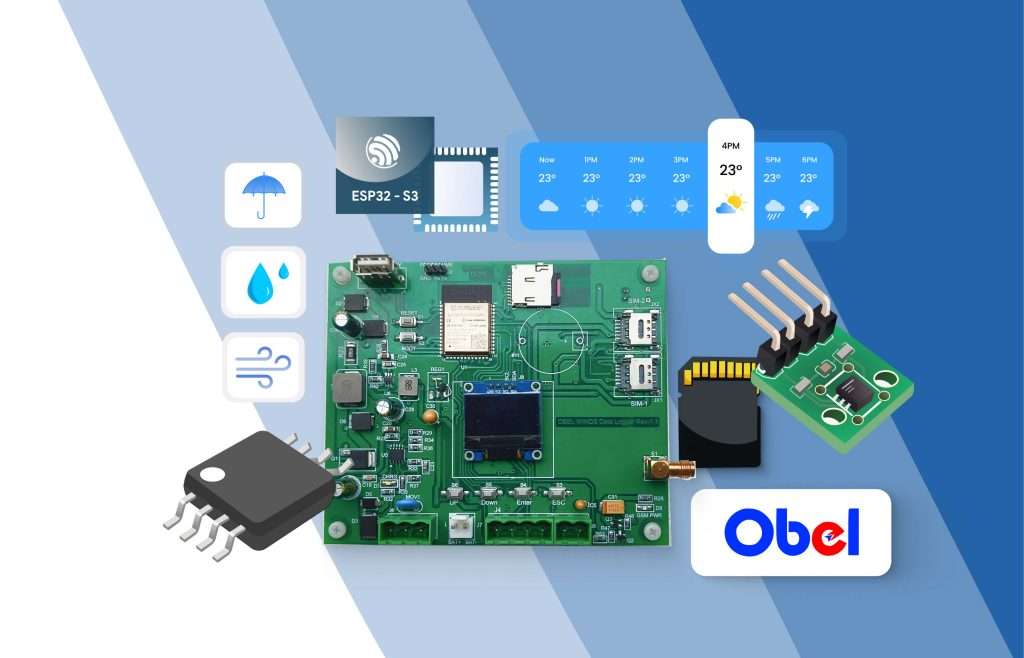Sensor DAQ - Wind sensor
Sensor/ DAQ
Wind sensor
Measure wind speed and direction accurately with low-power wind sensors for reliable environmental monitoring.
What is a Wind Sensor?
A wind sensor measures wind speed and direction with high accuracy. In IoT applications, wind sensors provide essential environmental data for industries that rely on weather-related insights, such as agriculture, renewable energy, and smart infrastructure. Our wind sensor solutions empower businesses to make data-driven decisions, optimize performance, and enhance safety in dynamic environments.
Applications:
Our wind sensors deliver practical and innovative applications across various industries:
Agriculture
Optimize crop protection by monitoring wind conditions for pesticide spraying and irrigation scheduling.
Renewable Energy
Enhance wind farm efficiency by analyzing wind speed and direction for optimal turbine operation.
Smart Cities
Support urban planning and safety by monitoring wind patterns for public safety, air quality, and infrastructure maintenance.
Logistics and Shipping
Improve maritime and aerial operations by providing real-time wind data to ensure safe and efficient navigation.
Construction
Ensure site safety by tracking wind conditions during crane operations or high-rise construction activities.
Our wind sensor solutions provide the actionable insights needed to improve efficiency, safety, and environmental awareness.
How Data Acquisition Happens
Our wind sensors measure wind speed using ultrasonic or mechanical methods and detect wind direction with precision. The data is captured in real time and processed by an embedded microcontroller. This processed data is then transmitted using IoT communication protocols such as LoRaWAN, Wi-Fi, or Bluetooth.
The data is sent to a cloud-based platform or edge device, where it can be visualized, analyzed, and acted upon. Real-time dashboards, analytics, and automated alerts provide continuous updates and help businesses respond to changing wind conditions promptly.
Peripheral Integration
Our wind sensors are designed to seamlessly integrate with a wide array of IoT devices and platforms, including:
Weather Stations for comprehensive environmental monitoring.
Edge Computing Devices to enable real-time, on-site processing.
Automated Control Systems for dynamic responses, such as adjusting turbine angles in wind farms or pausing operations in hazardous wind conditions.
Cloud Platforms for data storage, visualization, and analytics.
Standard APIs and communication protocols ensure smooth interoperability with existing systems, enhancing the scalability and efficiency of your IoT ecosystem.
Features
High Accuracy
Provides precise measurements of wind speed and direction.
Real-Time Data
Continuous monitoring and immediate data transmission.
Wireless Connectivity
Supports LoRaWAN, Wi-Fi, and Bluetooth communication.
Rugged Design
Built to withstand harsh environmental conditions (rain, dust, extreme temperatures).
Low Power Consumption
Optimized for long-term, battery-powered operation.
Fast Sampling Rates
High-frequency data collection for time-sensitive applications.
Easy Installation
Simplified setup for rapid deployment.
Secure Data Transmission
Ensures data integrity with encryption and secure communication protocols.
Usecases
Wind Sensor in Obel DLX5C
We utilized the RS485 Wind Sonic Peripheral Sensor in the Obel DLX5C device to achieve accurate real-time wind speed and direction measurements. This enabled the Indian Government’s Hydrology and Meteorology Departments to monitor wind conditions effectively. The sensor’s robust RS485 protocol ensures long-distance, noise-resistant data transmission, seamlessly integrating with the GSM module for secure data updates and alert generation.
